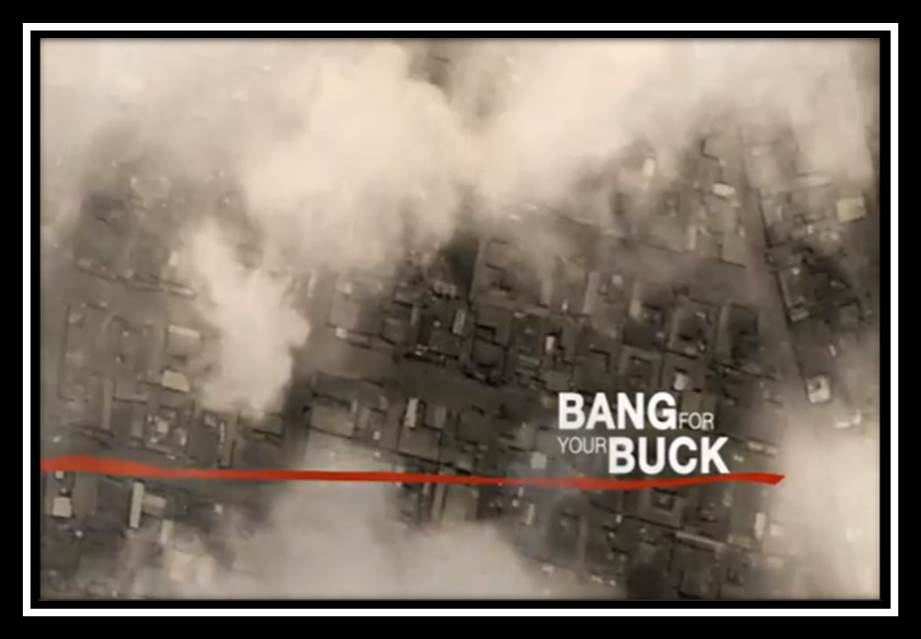The 15 minute film “Bang For Your Buck,” is a prize winner in Oxfam’s “Shooting Poverty” campaign. With this film, the Control Arms Coalition, and Oxfam International in particular, highlight Burundi as a good example of a bad situation, where “a hand grenade costs less than a pint of beer.” The film is highly descriptive of the truly horrible situation in Burundi, where armed violence, especially with grenades, is a serious problem for civil society.
This film starts out well by painting a very grim picture of the problem facing Burundi’s civil society. It does this by framing Burundi as being obviously and seriously afflicted with a “disease” of too many weapons of war in civil society, with petty disputes often ending in horrible carnage. For example, the film asserts that the favorite weapons for common criminals are actually hand grenades, a weapon that clearly belongs only in the hands of lawful combatants in armed conflict. The film makes a compelling case for a “cure” by personalizing a gruesome story of a family of six killed at home in an attack involving three hand grenades, all over some kind of neighborhood dispute. Then, the film cuts to interviews with the individual convicted of this crime, experts, and a former arms dealer to provide some context and to tee-up the call to action at the end.
If there is an opportunity for improvement, it is the call to action at the end. The basic problem is that film illogically leaps from describing horrible armed violence with hand grenades to advocating blanket stricter controls on the international arms trade after the people interviewed in the film actually suggests the root cause of the problem is right at home: the socialization of the people and the government of Burundi.
Nobody should argue against the idea that developing/fragile states need help, especially those disproportionately affected by pervasive armed violence. And it is right for the people living there to ask for help and for the world to reach out to them. But advocating for global controls the arms trade as a silver-bullet “cure” for what is evidently a local problem does not seem practical or even helpful.
In context, the advocacy meta-message is to build the case for a highly restrictive and comprehensive Arms Trade Treaty, which does seem to perpetuate an unhealthy dependency on the Global North to solve what is essentially a domestic internal challenge of a limited number of states in the Global South. If one does basic research in to Burundi it becomes readily apparent that the fundamental challenge facing Burundi and other similar countries is weak/fragile internal governance, the lack of rule of law, and corruption. And this film should have focused more on this in its call to action. Relying on global institutions and the North to create international laws related to small arms seems misguided because they clearly will not have any meaningful impact in states still grappling with fundamental governance issues.
Relevant facts are important and they should drive policy making locally and globally. And it is a fact that international trafficking of small arms is NOT the driving factor behind armed violence in the most affected Southern countries, like Burunidi. Scholarship has debunked this assumption and it is dishonest and/or lazy not recognize this. Study has shown that for most developing or fragile states, a combination of deficient domestic regulation of legal firearms possession with theft, and loss or corrupt sale from official inventories is a more serious problem than illicit trafficking across borders…and the personal stories in “Bang For Your Buck” reinforce this conclusion.
With respect to Burundi in particular, it is essential to remember that it has lived through 2 recent genocides and is renowned for its reputation for being among the poorest and most corrupt states in the world. And it seems that the answer to their armed violence problems will not be found in blanket solutions like a extremely restrictive Arms Trade Treaty. Burundi and other states like it, along with their humanitarian friends in the North, should prioritize on fundamental governance problems caused by endemic corruption and the lack of rule of law, and marshal international resources to attack and resolve these road-blocks first.
“Bang For Your Buck” has a good story, and important messages. The film’s value seem to be undermined by the add-on message at the end, about the arms trade. This add-on message wasn’t supported by what the film’s story telling and was actually contradicted by it. From an advocacy point of view, the ending call to action message was an awkward nonsequitur that was debatable and distracting. If the film successfully presented a change imperative, it was for helping set the local conditions for improved governance and building institutional capacities so that the rule of law can thrive, not creating international treaties and hoping to change internal conditions from the outside in.
Notes:
1. Control Arms has used Burundi as an instructive example of the perils of the arms trade. A direct link to this video and other information about its makers can be found here: http://www.oxfam.org/en/campaigns/conflict/shooting-poverty-true-cost-arms-trade.
2. The UN ranked Burundi 185 of 187 countries in terms of human development. See profile at http://hdrstats.undp.org/en/countries/profiles/BDI.html.
3. The UN Office of Disarmament Affairs features the “Bang For Your Buck” movie in its online education repository here: http://www.un.org/disarmament/education/Movies/bang_for_your_buck/
4. Transparency international ranked Burundi the most corrupt country in East Africa in 2011. See report at http://www.transparency.org/news/pressrelease/20111020_EABI.
5. Burundi is the 4th poorest country in the world according to the International Monetary Fund in terms of GDP at purchasing power parity per capita in 2011. See IMF output data available at http://www.imf.org/external/pubs/ft/weo/2012/01/weodata/index.aspx.
6. For more information about the relative unimportance of international trafficking relative to internal governance and the rule of law in most fragile states, see Owen Greene and Nicholas Marsh, eds. Small Arms, Crime and Conflict: Global Governance and the Threat of Armed Violence. Routledge: 2012. P. 90-91.

